Fleurs du Mal Magazine


Or see the index
In The Mathematics of the Breath and the Way, Charles Bukowski considers the art of writing, and the art of living as writer.
 Bringing together a variety of previously uncollected stories, columns, reviews, introductions, and interviews, Mathematics finds him approaching the dynamics of his chosen profession with cynical aplomb, deflating pretentions and tearing down idols armed with only a typewriter and a bottle of beer.
Bringing together a variety of previously uncollected stories, columns, reviews, introductions, and interviews, Mathematics finds him approaching the dynamics of his chosen profession with cynical aplomb, deflating pretentions and tearing down idols armed with only a typewriter and a bottle of beer.
Beginning with the title piece—a serious manifesto disguised as off-handed remarks en route to the racetrack—Mathematics runs through numerous tales following the author’s adventures at poetry readings, parties, film sets, and bars, and also features an unprecedented gathering of Bukowski’s singular literary criticism.
From classic authors like Hemingway to underground legends like d.a. levy to his own stable of obscure favorites, Bukowski uses each occasion to expound on the larger issues around literary production.
The book closes with a handful of interviews in which he discusses his writing practices and his influences, making Mathematics a perfect guide to the man behind the myth and the disciplined artist behind the boozing brawler.
The method behind the madness, revealing the critical acumen of everyone’s favorite Dirty Old Man.
“Genius could be the ability to say a profound thing in a simple way, or even to say a simple thing in a simpler way.”—Charles Bukowski
Charles Bukowski was born in Andernach, Germany on August 16, 1920, the only child of an American soldier and a German mother. At the age of three, he came with his family to the United States and grew up in Los Angeles. He attended Los Angeles City College from 1939 to 1941, then left school and moved to New York City to become a writer. His lack of publishing success at this time caused him to give up writing in 1946 and spurred a ten-year stint of heavy drinking. After he developed a bleeding ulcer, he decided to take up writing again. He worked a wide range of jobs to support his writing, including dishwasher, truck driver and loader, mail carrier, guard, gas station attendant, stock boy, warehouse worker, shipping clerk, post office clerk, parking lot attendant, Red Cross orderly, and elevator operator. He also worked in a dog biscuit factory, a slaughterhouse, a cake and cookie factory, and he hung posters in New York City subways.
Bukowski published his first story when he was twenty-four and began writing poetry at the age of thirty-five. His first book of poetry was published in 1959; he went on to publish more than forty-five books of poetry and prose, including Pulp (Black Sparrow, 1994), Screams from the Balcony: Selected Letters 1960-1970 (1993), and The Last Night of the Earth Poems (1992), and the following books with City Lights Publishers: Notes of a Dirty Old Man (1981), The Most Beautiful Woman in Town & Other Stories (1983), Tales of Ordinary Madness (1984), Portions from a Wine-Stained Notebook: Uncollected Stories and Essays, 1944-1990 (2008), Absence of the Hero: Uncollected Stories and Essays, Vol. 2: 1946-1992 (2010), More Notes of a Dirty Old Man: The Uncollected Columns (2011), and The Bell Tolls for No One (2015). He died of leukemia in San Pedro on March 9, 1994.
Title: The Mathematics of the Breath and the Way
Subtitle: On Writers and Writing
Author: Charles Bukowski
Introduction by David Stephen Calonne
Edited by David Stephen Calonne
Publisher: City Lights Publishers
Format Paperback
ISBN-10 0872867595
ISBN-13 9780872867598
250 Pages
List Price $16.95
Publication Date 15 May 2018
new books
fleursdumal.nl magazine
More in: - Book News, Archive A-B, Archive A-B, Art & Literature News, Bukowski, Charles, Opium-Eaters

Sibelius
Sibelius symphony number eight
On his lips he sounded natures
cry, natures sinewy sigh
and gripped in encapsulation
its voices in dots and dashes.
His work swept the oceans
searching for ringing melodies,
the cosmos dancing in rhythm
through its internal magnetism.
Sounds from the milky way
readily formed within him,
carbon from the core twinkling,
vibrating, the many strings flying
in rich tones, in its resurrection
when death looked imminent
awoke when barely conscious.
He took the new and ancient
and slanted the nucleus
of his vivid expression
into the pool of swirling
existence.
And when the structure
was created,
when the monument was built,
the music gasping for
the air of existence,
for the universe to burst
he burnt the lot
and fell inward, into silence,
where his voice lived only
for his wife and children.
He sat down quietly
and never again lifted
his psyche to varnish sound
with brilliant shimmers.
21.09.07
Vincent Berquez
Poem: Sibelius
Vincent Berquez is a London–based artist and poet
fleursdumal.nl magazine
More in: Archive A-B, Berquez, Vincent, MUSIC, Vincent Berquez
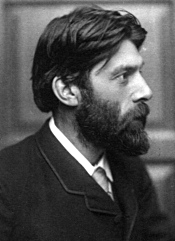
To the President of Magdalen College, Oxford
Since now from woodland mist and flooded clay
I am fled beside the steep Devonian shore,
Nor stand for welcome at your gothic door,
‘Neath the fair tower of Magdalen and May,
Such tribute, Warren, as fond poets pay
For generous esteem, I write, not more
Enhearten’d than my need is, reckoning o’er
My life-long wanderings on the heavenly way:
But well-befriended we become good friends,
Well-honour’d honourable; and all attain
Somewhat by fathering what fortune sends.
I bid your presidency a long reign,
True friend; and may your praise to greater ends
Aid better men than I, nor me in vain.
Robert Bridges
(1844-1930)
To the President of Magdalen College, Oxford
fleursdumal.nl magazine
More in: *War Poetry Archive, Archive A-B, Bridges, Robert, WAR & PEACE
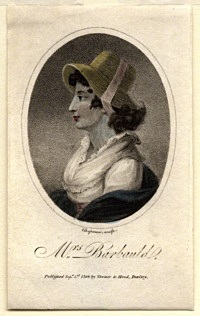
Life
Life! I know not what thou art,
But know that thou and I must part;
And when, or how, or where we met,
I own to me ‘s a secret yet.
But this I know, when thou art fled,
Where’er they lay these limbs, this head,
No clod so valueless shall be
As all that then remains of me.
O whither, whither dost thou fly?
Where bend unseen thy trackless course?
And in this strange divorce,
Ah, tell where I must seek this compound I?
To the vast ocean of empyreal flame
From whence thy essence came
Dost thou thy flight pursue, when freed
From matter’s base encumbering weed?
Or dost thou, hid from sight,
Wait, like some spell-bound knight,
Through blank oblivious years th’ appointed hour
To break thy trance and reassume thy power?
Yet canst thou without thought or feeling be?
O say, what art thou, when no more thou’rt thee?
Life! we have been long together,
Through pleasant and through cloudy weather;
‘Tis hard to part when friends are dear;
Perhaps ’twill cost a sigh, a tear;–
Then steal away, give little warning,
Choose thine own time;
Say not Good-night, but in some brighter clime
Bid me Good-morning!
Anna Laetitia Barbauld
(1743-1825)
Life
fleursdumal.nl magazine
More in: Archive A-B, Archive A-B, CLASSIC POETRY
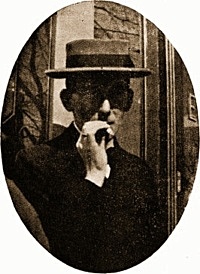
Die Sonne
Zwischen meinen Augenlidern fährt ein Kinderwagen.
Zwischen meinen Augenlidern geht ein Mann mit einem Pudel.
Eine Baumgruppe wird zum Schlangenbündel und zischt in den Himmel.
Ein Stein hält eine Rede. Bäume in Grünbrand. Fliehende Inseln.
Schwanken und Muschelgeklingel und Fischkopf wie auf dem Meeresboden.
Meine Beine strecken sich aus bis zum Horizont. Eine Hofkutsche knackt
Drüber weg. Meine Stiefel ragen am Horizont empor wie die Türme einer
Versinkenden Stadt. Ich bin der Riese Goliath. Ich verdaue Ziegenkäse.
Ich bin ein Mammuthkälbchen. Grüne Grasigel schnüffeln an mir.
Gras spannt grüne Säbel und Brücken und Regenbögen über meinen Bauch.
Meine Ohren sind rosa Riesenmuscheln, ganz offen. Mein Körper schwillt an
Von Geräuschen, die sich gefangen haben darin.
Ich höre das Meckern
Des großen Pan. Ich höre die zinnoberrote Musik der Sonne. Sie steht
Links oben. Zinnoberrot sprühen die Fetzen hinaus in die Weltnacht.
Wenn sie herunterfällt, zerquetscht sie die Stadt und die Kirchtürme
Und alle Vorgärten voll Krokus und Hyazinthen, und wird einen Schall geben
Wie Blech von Kindertrompeten.
Aber es ist in der Luft ein Gegeneinanderwehen von Purpur und Eigelb
Und Flaschengrün: Schaukeln, die eine orangene Faust festhält an langen Fäden,
Und ist ein Singen von Vogelhälsen, die über die Zweige hüpfen.
Ein sehr zartes Gestänge von Kinderfahnen.
Morgen wird man die Sonne auf einen großrädrigen Wagen laden
Und in die Kunsthandlung Caspari fahren. Ein viehköpfiger Neger
Mit wulstigein Nacken, Blähnase und breitem Schritt wird fünfzig weiß-
Juckende Esel halten, die vor den Wagen gespannt sind beim Pyramidenbau.
Eine Menge blutbunten Volks wird sich stauen:
Kindsbetterinnen und Ammen,
Kranke im Fahrstuhl, ein stelzender Kranich, zwei Veitstänzerinnen.
Ein Herr mit einer Ripsschleifenkrawatte und ein rotduftender Schutzmann.
Ich kann mich nicht halten: Ich bin voller Seligkeit. Die Fensterkreuze
Zerplatzen. Ein Kinderfräulein hängt bis zum Nabel aus einem Fenster heraus.
Ich kann mir nicht helfen: Die Dome zerplatzen mit Orgelfugen. Ich will
Eine neue Sonne schaffen. Ich will zwei gegeneinanderschlagen
Wie Zymbeln, und meiner Dame die Hand hinreichen. Wir werden entschweben
In einer violetten Sänfte über die Dächer euerer
Hellgelben Stadt wie Lampenschirme aus Seidenpapier im Zugwind.
Hugo Ball
(1886 – 1927)
Erstdruck in:
Die Aktion (Berlin),
4. Jg., Nr. 22, Mai 1914
fleursdumal.nl magazine
More in: Archive A-B, Ball, Hugo, Dada, DADA, Dadaïsme
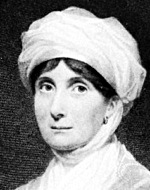
The Outlaw’s Song
The chough and crow to roost are gone,
The owl sits on the tree,
The hush’d wind wails with feeble moan,
Like infant charity.
The wild-fire dances on the fen,
The red star sheds its ray;
Uprouse ye then, my merry men!
It is our op’ning day.
Both child and nurse are fast asleep,
And closed is every flower,
And winking tapers faintly peep
High from my lady’s bower;
Bewilder’d hinds with shorten’d ken
Shrink on their murky way;
Uprouse ye then, my merry men!
It is our op’ning day.
Nor board nor garner own we now,
Nor roof nor latched door,
Nor kind mate, bound by holy vow
To bless a good man’s store;
Noon lulls us in a gloomy den,
And night is grown our day;
Uprouse ye then, my merry men!
And use it as ye may.
Joanna Baillie
(1762-1851)
The Outlaw’s Song
fleursdumal.nl magazine
More in: Archive A-B, Archive A-B, CLASSIC POETRY

De laatste s
Het hart zij zuiver binnenin, niet meer door
dwaze trots verteerd, het lichaam matig,
afgekeerd van overdaad en rein van zin. Sint
pura cordis íntima, absístat et vecórdia: carnis
terat supérbiam potus cibíque párcitas. Hij houdt
van het doorsissen van de laatste s, van geloven
tegen de draad in. Hij ziet zijn mensen graag.
De hostie kleeft hen in de mond. Ze zijn zo zeker
dat ze niet meer weten van welke parochie ze zijn.
Bert Bevers
Gedicht: De laatste s
Uit Andere taal, Uitgeverij Litera Este, Borgerhout, 2010
Bert Bevers is a poet and writer who lives and works in Antwerp (Be)
fleursdumal.nl magazine
More in: Archive A-B, Archive A-B, Bevers, Bert
 From the self-illustrated, unpublished work written in 1947 to hardboiled contributions to 1980s adult magazines, The Bells Tolls for No One presents the entire range of Bukowski’s talent as a short story writer, from straight-up genre stories to postmodern blurring of fact and fiction.
From the self-illustrated, unpublished work written in 1947 to hardboiled contributions to 1980s adult magazines, The Bells Tolls for No One presents the entire range of Bukowski’s talent as a short story writer, from straight-up genre stories to postmodern blurring of fact and fiction.
An informative introduction by editor David Stephen Calonne provides historical context for these seemingly scandalous and chaotic tales, revealing the hidden hand of the master at the top of his form.
Born in Andernach, Germany, and raised in Los Angeles, Charles Bukowski published his first story when he was twenty-four and began writing poetry at the age of thirty-five. His first book of poetry was published in 1959; he would eventually publish more than forty-five books of poetry and prose. He died of leukemia in San Pedro, California on March 9, 1994.
David Stephen Calonne is the author of several books and has edited three previous collections of the uncollected work of Charles Bukowski for City Lights: Absence of the Hero, Portions from a Wine-Stained Notebook, and More Notes of a Dirty Old Man.
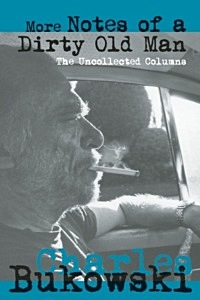 The Paris Review:
The Paris Review:
“Bukowski’s The Bell Tolls for No One, recently released in a comic-book-like paperback, follows the hardboiled genre bent that reached its surreal apotheosis in his final novel, Pulp. The obvious influence is to Hemingway—see: the title—but perhaps more interestingly, the editor David Stephen Calonne notes Bukowski’s debt to the crime writer James M. Cain, who had also, unbeknownst to me, shaped the style of Camus’s The Stranger. The book includes some of Bukowski’s roughly drawn illustrations, which fall somewhere close to pornographic Ziggy or adult-themed New Yorker cartoons. One features an asthmatic customer at an adult bookstore asking the cashier to inflate his blow-up doll for him; another shows an expressionistically drawn party girl surrounded by gawking men with the caption “God, a woman could get bored.” The subject matter is a more amplified version of the usual Bukowski fare—stalwart, sleazebag protagonists; spectral, deathly women with emphatically described upper legs. As always, the most one can hope for in Bukowski’s universe is “a grim yet comfortable isolation.”—Casey Henry in The Paris Review
“He had a good wife. I remember one time they cleaned
up my face with cotton and some kind of sterilizer when
it was all smashed-in from a bad night out. They seemed
very tender and concerned and serious about my smashed-
in face, and it was a very odd feeling to me, that care.
Anyhow, the drinking got to Mick, and it gets to each
of us differently. With him, the body swelled up, doubled,
tripled in size in various places. He couldn’t zip his pants
and had to cut slits in the pant legs. His story was that they
didn’t have a bed for him in the vet’s hospital. My feeling
was that he didn’t want to go there. Anyhow, one day he
made a foolish move and tried the General Hospital.
After a couple of days he phoned me. “Jesus Christ,
they’re killing me! I’ve never seen a place like this. No doc-
tors anywhere and nurses don’t give a damn and just these
fruit orderlies running around like snobs and happy that
everybody’s sick and dying. What the fuck is this place?
They’re carrying the dead out by the dozens!”
-Charles Bukowski
Title: The Bell Tolls for No One
Author: Charles Bukowski
Edited by David Stephen Calonne
Publisher City Lights Publishers
Format Paperback
ISBN-10 0872866823
ISBN-13 9780872866829
Publication Date 14 July 2015
308 pages
Price $14.95
short story writer books
fleursdumal.nl magazine
More in: - Book News, Archive A-B, Archive A-B, Art & Literature News, Bukowski, Charles
“Once upon a time, men, women and (secretly) children smoked.”
 Following the success of Cataract, John Berger, one of the great soothsayers of seeing, joins forces again with Turkish illustrator Selcuk Demirel. This charming pictorial essay reflects on the cultural implications of smoking. A subtle and beautifully illustrated prose poem, Smoke lingers in the mind.
Following the success of Cataract, John Berger, one of the great soothsayers of seeing, joins forces again with Turkish illustrator Selcuk Demirel. This charming pictorial essay reflects on the cultural implications of smoking. A subtle and beautifully illustrated prose poem, Smoke lingers in the mind.
This charming illustrated work reflects on the cultural implications of smoking, and suggests, through a series of brilliantly inventive illustrations, that society’s attitude to smoke is both paradoxical and intolerant. It portrays a world in which smokers, banished from public places, must encounter one another as outlaws. Meanwhile, car exhausts and factory chimneys continue to pollute the atmosphere. Smoke is a beautifully illustrated prose poem that lingers in the mind.
“A cigarette is a breathing space. It makes a parenthesis. The time of a cigarette is a parenthesis, and if it is shared you are both in that parenthesis. It’s like a proscenium arch for a dialogue.” – John Berger (in interview)
In contemporary English letters John Berger seems to me peerless. Not since D. H. Lawrence has there been a writer who offers such attentiveness to the sensual world with responsiveness to the imperatives of conscience.
—Susan Sontag
In his ceaselessly inventive work, Selçuk often uses parts of the body in ways that are characteristically Turkish…as if the comedy of the human condition were there in the human body, in the melancholy of anatomy.
—John Berger, on Selçuk Demirel
Smoke
by John Berger (Author)
and Selcuk Demirel (Illustrator)
Hardcover, $18.95
Available in Hardcover on May 8, 2018
ISBN10 1910749478
ISBN13 9781910749470
From Notting Hill Editions
70 pages
new books
fleursdumal.nl magazine
More in: - Book News, Archive A-B, Archive A-B, Archive C-D, Art & Literature News, Illustrators, Illustration, John Berger, Susan Sontag

Domburg
Villa Carmen Sylva: een lang geleden koningin
heeft in haar woning nog haar naam bewaard.
Met haar verzen is zij door de mazen van het net
des tijds reeds verdwenen. Dit dorp heeft zich
sedertdien schrap gezet in langzaam blijven.
Vloeden laten zich gedwee door palen breken,
dwars zitten duinen tussen bosch & zee.
Wij kuieren hier, in al ons wonen Scheldetrouw,
de drempel tussen jeugd en ouderdom omver.
Staren op die westenwind een meeuw na,
of vergeten van dit gezicht ons was verboden.
Weten in de kermis van de kennis in ons hoofd
zat oude tijden: met schip en vruchtenmand
als storm gilt uit alle hoeken fluistert Nehalennia.
Bert Bevers
Gedicht: Domburg
Eerder verschenen in De Vrije Domburger, 2001
Bert Bevers is a poet and writer who lives and works in Antwerp (Be)
fleursdumal.nl magazine
More in: Archive A-B, Archive A-B, Bevers, Bert

Sonet
Fra bank to bank, fra wood to wood I rin,
Ourhailit with my feeble fantasie;
Like til a leaf that fallis from a tree,
Or til a reed ourblawin with the win.
Twa gods guides me: the ane of tham is blin,
Yea and a bairn brocht up in vanitie;
The next a wife ingenrit of the sea,
And lichter nor a dauphin with her fin.
Unhappy is the man for evermair
That tills the sand and sawis in the air;
But twice unhappier is he, I lairn,
That feidis in his hairt a mad desire,
And follows on a woman throw the fire,
Led by a blind and teachit by a bairn.
Mark Alexander Boyd
(1563-1601)
Sonet
fleursdumal.nl magazine
More in: Archive A-B, Archive A-B, CLASSIC POETRY
A look back at the cultural and political force of Pulitzer Prize–winning poet Gwendolyn Brooks, in celebration of her hundredth birthday
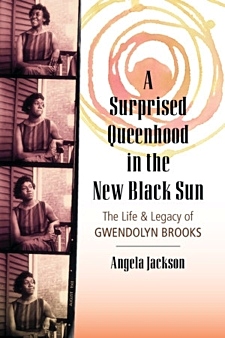 Pulitzer-Prize winning poet Gwendolyn Brooks is one of the great American literary icons of the twentieth century, a protégé of Langston Hughes and mentor to a generation of poets, including Sonia Sanchez, Nikki Giovanni, and Elizabeth Alexander.
Pulitzer-Prize winning poet Gwendolyn Brooks is one of the great American literary icons of the twentieth century, a protégé of Langston Hughes and mentor to a generation of poets, including Sonia Sanchez, Nikki Giovanni, and Elizabeth Alexander.
Her poetry took inspiration from the complex portraits of black American life she observed growing up on Chicago’s Southside—a world of kitchenette apartments and vibrant streets. From the desk in her bedroom, as a child she filled countless notebooks with poetry, encouraged by the likes of Hughes and affirmed by Richard Wright, who called her work “raw and real.”
Over the next sixty years, Brooks’s poetry served as witness to the stark realities of urban life: the evils of lynching, the murders of Emmett Till and Malcolm X, the revolutionary effects of the civil rights movement, and the burgeoning power of the Black Arts Movement. Critical acclaim and the distinction in 1950 as the first black person ever awarded a Pulitzer Prize helped solidify Brooks as a unique and powerful voice.
 Now, in A Surprised Queenhood in the New Black Sun, fellow Chicagoan and award-winning writer Angela Jackson delves deep into the rich fabric of Brooks’s work and world. Granted unprecedented access to Brooks’s family, personal papers, and writing community, Jackson traces the literary arc of this artist’s long career and gives context for the world in which Brooks wrote and published her work. It is a powerfully intimate look at a once-in-a-lifetime talent up close, using forty-three of Brooks’s most soul-stirring poems as a guide.
Now, in A Surprised Queenhood in the New Black Sun, fellow Chicagoan and award-winning writer Angela Jackson delves deep into the rich fabric of Brooks’s work and world. Granted unprecedented access to Brooks’s family, personal papers, and writing community, Jackson traces the literary arc of this artist’s long career and gives context for the world in which Brooks wrote and published her work. It is a powerfully intimate look at a once-in-a-lifetime talent up close, using forty-three of Brooks’s most soul-stirring poems as a guide.
 From trying to fit in at school (“Forgive and Forget”), to loving her physical self (“To Those of My Sisters Who Kept Their Naturals”), to marriage and motherhood (“Maud Martha”), to young men on her block (“We Real Cool”), to breaking history (“Medgar Evers”), to newfound acceptance from her community and her elevation to a “surprising queenhood” (“The Wall”), Brooks lived life through her work.
From trying to fit in at school (“Forgive and Forget”), to loving her physical self (“To Those of My Sisters Who Kept Their Naturals”), to marriage and motherhood (“Maud Martha”), to young men on her block (“We Real Cool”), to breaking history (“Medgar Evers”), to newfound acceptance from her community and her elevation to a “surprising queenhood” (“The Wall”), Brooks lived life through her work.
Jackson deftly unpacks it all for both longtime admirers of Brooks and newcomers curious about her interior life. A Surprised Queenhood in the New Black Sun is a commemoration of a writer who negotiated black womanhood and incomparable brilliance with a changing, restless world—an artistic maverick way ahead of her time.
What shall I give my children? who are poor,
Who are adjudged the leastwise of the land,
Who are my sweetest lepers, who demand
No velvet and no velvety velour;
But who have begged me for a brisk contour,
Crying that they are quasi, contraband
Because unfinished, graven by a hand
Less than angelic, admirable or sure.
from ‘The Children of the Poor’
Angela Jackson is an award-winning poet, playwright, and novelist. She is the author of numerous collections of poetry, including the National Book Award–nominated And All These Roads Be Luminous: Poems Selected and New. Her novel Where I Must Go won the American Book Award in 2009. Its sequel, Roads, Where There Are No Roads, was published in 2017. Additionally, Jackson was longlisted for the Pulitzer Prize and a longlist finalist for the PEN Open Book Award for her 2015 poetry collection, It Seems Like a Mighty Long Time. Other honors include a Pushcart Prize, Academy of American Poets Prize, TriQuarterly’s Daniel Curley Award, and the Poetry Society of America’s Shelley Memorial Award. Jackson lives in Chicago.
A Surprised Queenhood in the New Black Sun
The Life & Legacy of Gwendolyn Brooks
By Angela Jackson
Paperback – $18.00
ISBN 9780807059128
Published by Beacon Press
208 Pages
May 29, 2018
new books
fleursdumal.nl magazine
More in: - Book News, Archive A-B, Archive A-B, Archive I-J, Archive I-J, BIOGRAPHY, REPRESSION OF WRITERS, JOURNALISTS & ARTISTS
Thank you for reading Fleurs du Mal - magazine for art & literature